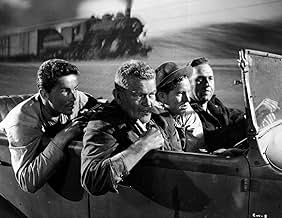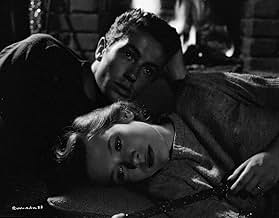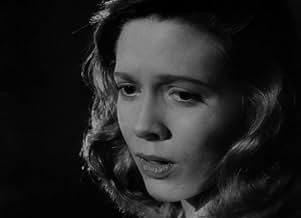IMDb रेटिंग
7.4/10
10 हज़ार
आपकी रेटिंग
अपनी भाषा में प्लॉट जोड़ेंAn escaped convict injured during a robbery falls in love with the woman who nurses him back to health, but their relationship seems doomed from the beginning.An escaped convict injured during a robbery falls in love with the woman who nurses him back to health, but their relationship seems doomed from the beginning.An escaped convict injured during a robbery falls in love with the woman who nurses him back to health, but their relationship seems doomed from the beginning.
- निर्देशक
- लेखक
- स्टार
James Nolan
- Schreiber
- (as Jim Nolan)
Jane Allen
- Woman
- (बिना क्रेडिट के)
Paul Bakanas
- Shadow
- (बिना क्रेडिट के)
फ़ीचर्ड समीक्षाएं
An early, nearly-forgotten picture from the director of "Rebel Without a Cause", this story of fugitive love (though not in the same was as "Bonnie and Clyde" or "Gun Crazy") is in its own right a rather accomplished picture.
Farley Granger is best remembered for his Hitchcock roles, and he gives a good, multifaceted performance. It's clear from the get-go that despite the company he keeps and despite his time in prison, he's really a scared, uncertain kid. Cathy O'Donnell is all but forgotten, but here gives a nearly Oscar-calibre performance, extremely convincing and appealing as his naive bride.
The film is also notable for early use of helicopter shots of cars, and for its refusal to vilify either the criminals or the cops (one of the policemen admits that "the system failed him", an astonishing statement for 1949).
All in all, a film which deserves to be resurrected from its obscurity.
Farley Granger is best remembered for his Hitchcock roles, and he gives a good, multifaceted performance. It's clear from the get-go that despite the company he keeps and despite his time in prison, he's really a scared, uncertain kid. Cathy O'Donnell is all but forgotten, but here gives a nearly Oscar-calibre performance, extremely convincing and appealing as his naive bride.
The film is also notable for early use of helicopter shots of cars, and for its refusal to vilify either the criminals or the cops (one of the policemen admits that "the system failed him", an astonishing statement for 1949).
All in all, a film which deserves to be resurrected from its obscurity.
This is a very good film noir movie with excellent performances from the leads Farley Granger (of Hitchcock's "Rope" and "Strangers on a Train" and another great film noir movie "The Edge of Doom") and Cathy O'Donnell, whom I have not seen in any other role. Howard Da Silva also gives an excellent performance as a "one-eyed lush" of a gangster. I saw this movie as a teenager when it first came out and had not seen it since until recently, but I still think it holds up well as a movie well worth watching. Farley Granger, who tired of being cast as a "pretty boy" in trouble with the law and sought his fortunes elsewhere, in Europe, was a big loss to American movies.
This was the first pairing of Farley Granger and Cathy O'Donnell and it was successful enough so that the two worked together two years later in "Side Street. I heard that this movie was sort of a early "Bonnie and Clyde," and it was, but only to a degree.
Granger and O'Donnell didn't really dominate the screen until after 40 minutes but after that, it was mostly them. Frankly, I enjoyed the first 40 minutes best when Howard da Silva and J.C. Flippen shared the screen time. They were great film noir characters in this movie (and they did come back in the second half, livening up the film again.) I liked their names in here: da Silva was "Chicamaw." and Flippen was "T-Dub." In most of the second half of this movie, it went from a noir to a romance. but that's not surprising knowing the director was Nicholas Ray.
This is the best I've ever seen O'Donnell, who never impressed me much but she's impressive here with a fine performance and a nice '40s look to her. She had a strange character name, too: "Keechie." Granger ("Arthur Bowers") does a nice job, too. For an uneducated thug, he sure comes across as a really nice guy. It's kinda of weird. He reminded me of John Dall in "Gun Crazy" (1950). Some of the camera-work also reminded me of "Gun Crazy."
However, one major detail should be noted: unlike "Gun Crazy" and "Bonnie & Clyde," the two lovers in this movie did NOT rob banks together. O'Donnell's character never gets involved in any crime, so comparing this film to those doesn't really fit. Most of "Keechie's" time is spent living in a remote cabin lodge, and suggesting periodically to her husband that he go straight - a far cry from the women Peggy Cummins and Faye Dunaway played.
Like a lot of good film noirs, this also has some very good supporting actors who play weird people, and say weird things. Some of the dialogue in this movie is fascinating because it's so odd. One example is the guy who marries the couple for $20. Another is Keechie's father.
This is a odd little "B" noir/melodrama and definitely one that film noir fans should check out. Romantics will like it, too. I'm glad it is now available on disc, as part of the Film Noir Classics Collection Volume 4.
Granger and O'Donnell didn't really dominate the screen until after 40 minutes but after that, it was mostly them. Frankly, I enjoyed the first 40 minutes best when Howard da Silva and J.C. Flippen shared the screen time. They were great film noir characters in this movie (and they did come back in the second half, livening up the film again.) I liked their names in here: da Silva was "Chicamaw." and Flippen was "T-Dub." In most of the second half of this movie, it went from a noir to a romance. but that's not surprising knowing the director was Nicholas Ray.
This is the best I've ever seen O'Donnell, who never impressed me much but she's impressive here with a fine performance and a nice '40s look to her. She had a strange character name, too: "Keechie." Granger ("Arthur Bowers") does a nice job, too. For an uneducated thug, he sure comes across as a really nice guy. It's kinda of weird. He reminded me of John Dall in "Gun Crazy" (1950). Some of the camera-work also reminded me of "Gun Crazy."
However, one major detail should be noted: unlike "Gun Crazy" and "Bonnie & Clyde," the two lovers in this movie did NOT rob banks together. O'Donnell's character never gets involved in any crime, so comparing this film to those doesn't really fit. Most of "Keechie's" time is spent living in a remote cabin lodge, and suggesting periodically to her husband that he go straight - a far cry from the women Peggy Cummins and Faye Dunaway played.
Like a lot of good film noirs, this also has some very good supporting actors who play weird people, and say weird things. Some of the dialogue in this movie is fascinating because it's so odd. One example is the guy who marries the couple for $20. Another is Keechie's father.
This is a odd little "B" noir/melodrama and definitely one that film noir fans should check out. Romantics will like it, too. I'm glad it is now available on disc, as part of the Film Noir Classics Collection Volume 4.
Nicholas Ray's first feature, in 1949, was an adaptation of the novel Thieves Like Us (which Robert Altman so memorably filmed in the mid-1970s). It's a bit of a surprise to encounter the same characters -- Bowie, Keechie, T-Dub et al. -- in postwar black-and-white. Farley Granger and Cathy O'Donnell play the star-crossed lovers later rended by Keith Carradine and Shelly Duvall, and they bring a vulnerable, doomed edge to this very interesting, tragic movie. (Granger may never have been better during his brief bout of stardom). The supporting cast isn't quite up to the level of Altman's (without Louise Fletcher and her odd little girl), but on the whole this remains an honorable and moving piece of film art -- and a vital instalment, along with the same year's Gun Crazy (also a tale of doomed, romantic outlaws), in the noir cycle.
Nicholas Ray's first film is a fascinating, enveloping example of a filmmaker getting as much as he can out of so little. His film was made under the radar at RKO, despite having John Houseman as a producer. While also having a cast of really unknowns, he also uses it to his advantage to tell a small story very well. It's close to being one of the more 'text-book' examples, in the story's core, in the history of B-noir (film-noir that didn't get the hype of The Big Sleep or Out of the Past, star vehicles as much as unique thrillers). Bowie (Farley Granger, soon to be a Hitchcock stock-player) escapes from jail with the help of a couple of bank robbers who make him, as they say, "an investment." He meets a girl, Keechie (Cathy O'Donnell), daughter of a farmer they pass by, and he becomes friends with her, so to speak. She agrees to leave town with him and they also decide, almost on a whim, to get married (for twenty bucks no less). But soon, very soon, fall in love, however, despite the checkered and now notorious past catching up to Bowie.
Obviously, if you're looking for stellar, "method" acting, look elsewhere in the main performances. But they do have enough of a pull in their chemistry on screen- sometimes rough and spelling of their doomed relationship, other times tragically tender- to back up the best aspects to the film. The true pleasures in seeing They Live By Night are the details that Ray lays in the scenes, bits of life probably taken from the book the movie's based on. Godard once proclaimed that Ray "IS cinema". If this statement does hold validity to a degree, it shows for certain even in Ray's debut in the scenes with the secondary platers. Such as the wedding scene, or in general with the dialog in the script (i.e. "Between him and the chicken, I'd bet on the chicken", or "I'm the black sheep" "the only thing black about you are your eyelashes), or even with the strengths in Ray's camera as a simple storyteller. In a sense this cuts right to the chase with the theme of doomed youth, years before Rebel Without a Cause yet with the given desperation of the noir films.
While generally less seen than Ray's other films (though more attributable to being less available on video), it's likely one of his best; a powerful mix of the bittersweet tale of a criminal and his love that would decades later meld with other crime-film elements into a work like True Romance.
Obviously, if you're looking for stellar, "method" acting, look elsewhere in the main performances. But they do have enough of a pull in their chemistry on screen- sometimes rough and spelling of their doomed relationship, other times tragically tender- to back up the best aspects to the film. The true pleasures in seeing They Live By Night are the details that Ray lays in the scenes, bits of life probably taken from the book the movie's based on. Godard once proclaimed that Ray "IS cinema". If this statement does hold validity to a degree, it shows for certain even in Ray's debut in the scenes with the secondary platers. Such as the wedding scene, or in general with the dialog in the script (i.e. "Between him and the chicken, I'd bet on the chicken", or "I'm the black sheep" "the only thing black about you are your eyelashes), or even with the strengths in Ray's camera as a simple storyteller. In a sense this cuts right to the chase with the theme of doomed youth, years before Rebel Without a Cause yet with the given desperation of the noir films.
While generally less seen than Ray's other films (though more attributable to being less available on video), it's likely one of his best; a powerful mix of the bittersweet tale of a criminal and his love that would decades later meld with other crime-film elements into a work like True Romance.
क्या आपको पता है
- ट्रिवियाThe opening helicopter shot was the first scene that Nicholas Ray ever directed.
- गूफ़The new Cadillac is seen to be covered with a tarpaulin. When the camera swings back to it, the tarpaulin has vanished.
- क्रेज़ी क्रेडिटOpening credits: This boy . . . and this girl . . . were never properly introduced to the world we live in . . . To tell their story . . .
- कनेक्शनEdited into Histoire(s) du cinéma: Le contrôle de l'univers (1999)
- साउंडट्रैकYour Red Wagon
by Richard M. Jones, Don Raye and Gene de Paul (as Gene DePaul)
Performed by Marie Bryant (uncredited)
[Sung by club performer]
टॉप पसंद
रेटिंग देने के लिए साइन-इन करें और वैयक्तिकृत सुझावों के लिए वॉचलिस्ट करें
- How long is They Live by Night?Alexa द्वारा संचालित
विवरण
- रिलीज़ की तारीख़
- कंट्री ऑफ़ ओरिजिन
- भाषा
- इस रूप में भी जाना जाता है
- Los amantes de la noche
- फ़िल्माने की जगहें
- उत्पादन कंपनी
- IMDbPro पर और कंपनी क्रेडिट देखें
बॉक्स ऑफ़िस
- बजट
- $8,08,397(अनुमानित)
- चलने की अवधि1 घंटा 35 मिनट
- रंग
- पक्ष अनुपात
- 1.37 : 1
इस पेज में योगदान दें
किसी बदलाव का सुझाव दें या अनुपलब्ध कॉन्टेंट जोड़ें







































